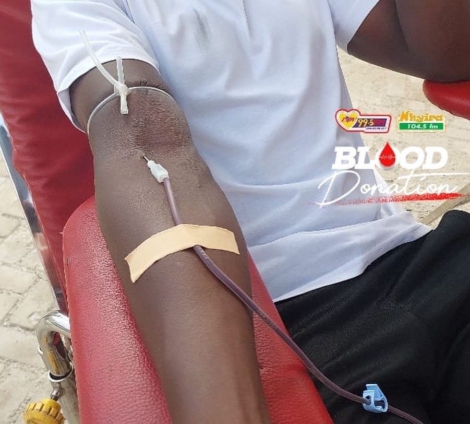
Audio By Carbonatix
A Medical Laboratory Scientist in Charge of the Blood Bank at the International Maritime Hospital (IMaH) in Tema, has urged Ghanaians to be honest when answering questions before they donate blood.
Ms. Doris Kusima Baiden explained that potential donors of blood were expected to answer a confidential questionnaire about their medical history before blood donation.
This is to give the health attendant a good idea of your general health and blood condition and foster a better service for donors and recipients.
Ms. Baiden was addressing issues related to blood donation at the weekly “Your Health! Our Collective Responsibility!" initiative by the Ghana News Agency aimed at promoting health-related communication and providing a platform for health information dissemination to influence personal health choices through improved health literacy
Ms. Baiden, supported by Mr. Robert Tetteh Djimajor, also a IMaH Medical Laboratory Scientist, explained that, as a routine before blood donation “we first take personal details like your name, age, date of birth, address, and other contacts. We then further proceed to ask confidential health questions.”
Ms. Baiden emphasised that donors were expected to come clean about medications taken in recent times, current health status, specific sexual activities, and other lifestyles.
“These questions are very confidential and help safeguard your own health and the health of the person receiving the blood. We only want to ensure that one is fully fit physically, mentally, and emotionally before donating blood,” she said.
She said that it is very important to be truthful because infections like HIV, Hepatitis B and C, and Syphilis could be transmitted by transfusion to a patient receiving blood.
She revealed that donating blood did not only benefit the receiver, but it also gave donors the chance to be offered a brief medical examination that included checking the temperature and pulse, blood pressure, ensuring minimum weight, and haemoglobin level.
“As a blood bank, it is our responsibility to ensure that all the blood coming in is safe for use and does not contribute to the loss of lives in the hospital. Saving lives is a collective responsibility, and all must endeavour to rightly go through the safe and secured procedures to donate blood,” she said.
Latest Stories
-
A Tax for Galamsey: Akwasi Acquah slams government for failing to punish complicit officials
1 hour -
Mahama departs Accra for AU Heads of State Summit in Addis Ababa
1 hour -
Equip women & youth with skills for Africa’s free-trade market – Telecel Ghana CEO
2 hours -
A Tax for Galamsey: MMDCEs risk becoming weakest link in galamsey fight – Akwasi Acquah
2 hours -
A Tax for Galamsey: Let the laws bite – Rev Quaicoe demands swift punishment for offenders
2 hours -
A Tax for Galamsey: We’ve gotten to a point where brute force must be applied – Elikem Kotoko
2 hours -
A Tax for Galamsey: The anger against illegal mining is not enough – Ken Ashigbey
3 hours -
A Tax for Galamsey: The president is determined to fight this canker – Elikem Kotoko
3 hours -
Galamsey: Ken Ashigbey calls for arrest of Tano North MCE over prospective licence issuance
3 hours -
FDA clamps down on unregistered diaper products in Ho Market
3 hours -
Beyond the Hills: A different story unfolds at Ashesi University
4 hours -
Cocoa sector crisis has exposed the NDC government – Dr Amin Adam
4 hours -
A Tax for Galamsey: Gov’t should’ve been more decisive – Daryl Bosu
4 hours -
Ken Ashigbey urges more investigative journalism to curb galamsey
4 hours -
Dr Gideon Boako announces reconstruction of Yamfo Market
4 hours

